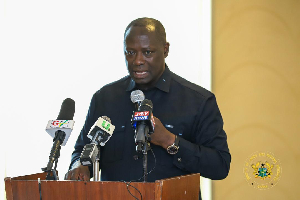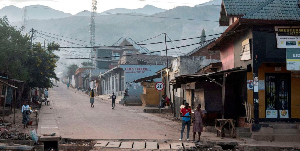... AN INNOVATIVE MEASURE TO IMPROVE RURAL EDUCATION
A GNA Feature by KWABIA OWUSU-MENSAH Kumasi, Dec. 28, GNA - The need to improve the quality of education to the Ghanaian child, especially those in the rural communities has been the concern of not only the Government but also the entire society. Lack of infrastructure, such as proper classroom blocks, furniture, textbooks, toilet facilities, teacher's accommodation and libraries have conspired against the provision of quality education in rural public basic schools.As a result, trained and professional teachers are unwilling to accept postings to these remote areas. The rural children, therefore, depend on the services of untrained teachers popularly call "pupil teachers" for their education.
Even though pupil teachers have made significant contribution to education in the rural communities, their efforts have not been able to bridge the academic gap that exists between the rural and urban child. The high dropout rate in rural areas is attributed to lack of professional teachers to use the appropriate methodology and teaching techniques to guide the children to develop their academic potentials at the tender age and to encourage them to continue to build upon them in order to progress academically.
It is in the light of this, that the decision by the Ministry of Education and Sports and the Ghana Education Service (GES) to provide professional training to these pupil teachers, is seen as a very laudable enterprise.
It is estimated that, there are about 24,000 untrained teachers currently serving in basic schools throughout the country. The four-year distance education programme known as the Untrained Teacher Training Diploma in Basic Education (UTTDBE), among other things, aims at advancing the personal and professional competence of the trainees in order to improve the quality of education at the basic school levels in Ghana.
It is also to produce teachers, who have a clear grasp of intended outcomes of their teaching activities and skills in monitoring, diagnosing and providing appropriate equal opportunities to all pupils. The programme would also help to reduce the percentage of the number of untrained teachers in the system.
The UTTDBE programmes is being carried out in four phases with the Northern, Upper East, Upper West and the Afram Plains District in the Eastern Region constituting the first phase. Already about 6,000 candidates have been enrolled.
Ashanti and Brong Ahafo Regions, which have started the second phase this year, are expected to enrol about 8,000 candidates. Western and Central Regions form the third phase while the Volta, Greater Accra and the remaining part of the Eastern Region would form the fourth phase.
It is estimated that, about 60 per cent of the 24,000 untrained teachers in the country would be enrolled as candidates to pursue the programme by the end of 2006.
It must be emphasized that, the UTTDBE programme is a bold attempt by the Government not only to reduce the inequalities that existed in the country's educational system, but a recognition of the importance of "pupil teachers" who readily accept postings to remote and deprived areas to cater for the schools there.
The Government is also demonstrating its commitment to poverty reduction since the trainees would be accepted into the formal teaching system and thereby receive, appropriate and sustainable incomes at the end of every month.
What makes the programme timely and appropriate is the introduction of the capitation grant by the Government to all public basic schools in the country.
With the introduction of the capitation grant coupled with the ongoing expansion of school infrastructure, school enrolment are increasing and there is the need for a corresponding increase in the number of professional teachers to teach in schools.
However, the 38 Teacher Training Colleges in the country are unable to produce the number of teachers required every year to teach in public basic schools. Meeting teacher demand in public basic schools has, therefore, become a challenge to the GES and Ministry of Education. The provision of adequate professional teachers in rural schools through the UTTDBE programme would, therefore, help to increase and sustain school enrolment and draw the Government nearer to meeting the Millennium Development Goal of education for all in the country. It is important and opportune for the district assemblies and nongovernmental organisations (NGOs) concern with the provision of quality education in their districts to embrace the programme and take keen interest in its implementation.
District assemblies should initiate sponsorship and attractive incentive packages to get untrained teachers in their districts to enrol and complete the programme.
This would not only increase the number of competent teachers in the district, but would also help to improve upon the quality of education in their respective districts.
These pupil teachers are already staying in the districts and would automatically continue to live and teach there after the training programme.
Already some teacher trainees and nurses, who have been sponsored by some district assemblies, have refused to accept postings to these districts. Parent Teacher Associations, (PTA) School Management Committees, traditional authorities and other influential people in the communities should also identify and support "pupil teachers" in their communities to pursue the programme to improve the academic status in their schools. It is important that the whole Ghanaian society look for alternative ways of improving education in rural communities. Society cannot continue to deny rural children the quality education that they deserve. And it is only through education that the country can achieve the objective of halving poverty in rural communities by 2025, as proposed in the Millennium Development Goals.














